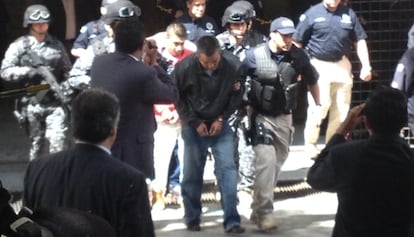Mexico’s Chief Prosecutor detains three suspected hitmen in the Heavens case
They are suspected of having killed 13 youths who were kidnapped in a downtown after-hours club


The Office of the Chief Prosecutor of Mexico has arrested three suspected hitmen for the abduction of 13 youths from an after-hours locale in downtown Mexico City and their subsequent murder. The so-called Heavens Case, named for the after-hours club, happened on May 26 and it was so unprecedented that it has drawn widespread attention around Mexico.
The 13 young people were found dead in a secret common grave on August 21. According to authorities at least 17 people took part in the kidnapping. Up until now six people had been arrested and charged with abduction. The three new detainees are the first to be charged with murder. In a surprising turn of events, given the Mexican government's conservative approach to communication about its anti-crime operations, the Office of the Chief Prosecutor gathered the press and introduced the accused.
Jonathan Robles, El Jonhy. Pedro Francisco Paz, Pancho Pulgas. Fernando Fernández, El Pez or The Fish. This Thursday, at about 3 p.m., they were taken by helicopter to an office of the Chief Prosecutor in Mexico City and there, before the media, the accused were turned over to another body, the district attorney's office in charge of the investigation. The detainees were dressed in casual garb and remained quiet. Local authorities escorted them into a truck and took them away.
As soon as the special forces team had taken off with the suspects, a high official of the Office of the Chief Prosecutor, Renato Sales, gave the names and told the press they were "probably responsible for the kidnapping and killing of the 13 people found in the common grave in Tlalmanalco," a small town near the capital. The official, joined by the city's prosecutor, Rodolfo Ríos, did not give further details or entertain any questions.
Among the six suspects who are currently in prison for the kidnapping (which took place around 11 a.m. on a Sunday in the middle of downtown, in one of the supposedly safest areas in all of Mexico) are two owners and two employees of the club. The other two people are said to have helped in the levantón or hoist, as abductions carried out specifically to kill and disappear individuals are called here in Mexico.
Up until now the office of the district attorney has maintained that the case was motivated by a conflict between rival gangs of the retail drug trade. Authorities say there was no involvement from the organized crime sector as is usually the case in other areas of the country. The prosecutor said that one of the detainees confessed that it all began as revenge for the murder of another person. Yet no information has been provided to suggest that one of the 13 abducted youths had been involved in a killing or that any of them had links to the criminal underworld.
The disconcerting proportion of the vendetta (13 dead to avenge one) and its criminal scope -the difficult management necessary to kidnap that many people in the middle of the capital without arousing suspicion, the operational organization it must have taken to kill them and bury them in a hillside town at one hour's drive from the city, do not correspond to the supposed motive -disputes between gangs.
Another contentious issue is that most of the victims' families refuse to acknowledge that the bodies found in the grave are those of their beloved. They say they do not trust the authorities because of the lapses in the investigation and the gaps in the information that came out. They say they will not believe the bodies are of their dead until an independent foreign forensics team analyzes the remains.
Monserrat Loza Fernández, 28, was a single mother of two, worked in a laundromat. Her body and that of Alan Francisco Daniel Menchaca Bazán, 31, were the only ones recovered by their families.
Translation: Dyane Jean François
Tu suscripción se está usando en otro dispositivo
¿Quieres añadir otro usuario a tu suscripción?
Si continúas leyendo en este dispositivo, no se podrá leer en el otro.
FlechaTu suscripción se está usando en otro dispositivo y solo puedes acceder a EL PAÍS desde un dispositivo a la vez.
Si quieres compartir tu cuenta, cambia tu suscripción a la modalidad Premium, así podrás añadir otro usuario. Cada uno accederá con su propia cuenta de email, lo que os permitirá personalizar vuestra experiencia en EL PAÍS.
En el caso de no saber quién está usando tu cuenta, te recomendamos cambiar tu contraseña aquí.
Si decides continuar compartiendo tu cuenta, este mensaje se mostrará en tu dispositivo y en el de la otra persona que está usando tu cuenta de forma indefinida, afectando a tu experiencia de lectura. Puedes consultar aquí los términos y condiciones de la suscripción digital.








































